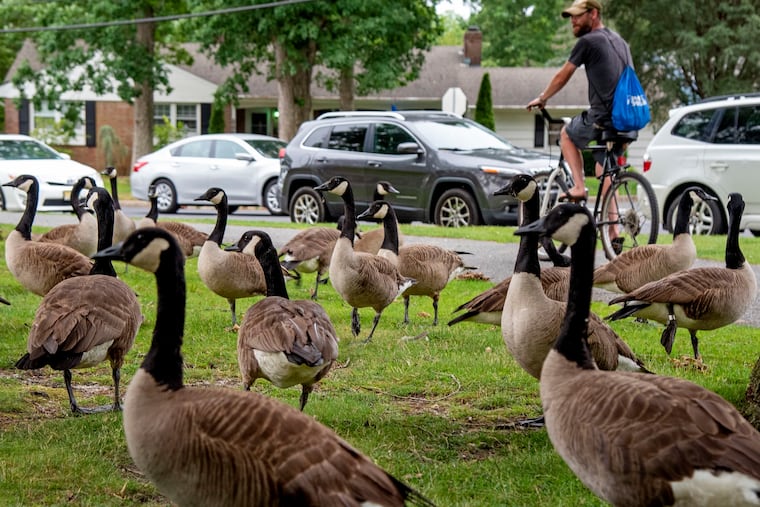It feels like Canada geese are everywhere, but studies show some populations are declining
Canada geese have been described as ‘poop machines,” going several times per hour, for most of the day.

Canada geese honk and hiss at us in suburban shopping centers, city parks, and on soccer fields, where players slide tackle through the mess they leave behind.
They seem to be everywhere.
Earlier this month, though, the Pennsylvania Game Commission said it would reduce the legal hunting days for Canada geese from 45 to 30 days for the 2024-’25 season, an announcement few non-hunters likely saw or even cared about. New Jersey Fish & Wildlife will do the same. Like a wildlife chemistry set, the world of fish and game management requires constant tinkering and studying, making yearly regulation tweaks common.
“With the population recently falling just below the threshold for a “liberal” season, the harvest strategy mandates a shorter hunting season for this population,” said Amanda Hoyt, a waterfowl biologist with the Game Commission.
The impetus for the reduced season, it turns out, might surprise most people in the Philadelphia region: The feds say some Canada geese populations have dropped from 160,000 to 115,000. While Canada geese are one species, U.S. Fish and Wildlife breaks them down into three populations: the Atlantic, Northern Atlantic, and Resident. Most of the geese you see breeding in the Philadelphia area are part of a Resident population, numbering 350,000, that lives up and down the East Coast.
“Year to year, it sometimes fluctuates, depending on weather conditions in their breeding grounds and how many young they had,” said Patrick K. Devers, of USFW’s Division of Migratory Bird Management.
Migratory geese have experienced “chronically cold conditions for the past several years” in Canada.
Resident geese
Resident geese are locals, like the Wawa mascot, and, according to New Jersey Fish & Wildlife, are “overabundant throughout most of the United States and cause significant damage problems.” The state has a special September hunt, in particular “zones,” timed so that hunters can be fairly sure they’re shooting a Resident goose, not one from an Atlantic or North Atlantic population.
“Those birds don’t migrate as far,” Devers said. “They do move around but maybe to Connecticut or New York.”
Devers said the overabundance of Resident geese is a contrast to a time when unregulated hunting nearly wiped out all the Canada geese. Resident geese were introduced across the U.S in the early 20th century. Laws like the Migratory Bird Treaty Act and increased hunting regulation helped, and numbers rebounded. According to the Game Commission, no Canada geese nested anywhere in Pennsylvania in 1935. Today they are found in all 67 counties.
“Their numbers were really low,” Devers said.
An unpopular gaggle
Today, all over America, people complain about Canada geese. Inmates say goose poop is fouling up a prison yard in California’s East Bay, while in Connecticut, one town is considering “employing dogs or lasers” to chase them away. One New Jersey man was arrested for running over and killing geese, while another driver was ticketed for harassing them.
“I was just driving around them and blowing my horn trying to get them off my lawn,” that man told The Inquirer in 2021.
They’ve been described as ”poop machines,” going several times per hour, for most of the day, and, of course, dogs like to roll in it, or worse.
There’s a small, international “I hate Canada Geese!!” Facebook group, and a larger one with, perhaps, a softer message: “Canada Geese are Jerks.”
For every goose hater, though, there’s someone who loves the large, migratory birds. There’s a whole website — lovecanadageese.com — run by a woman named Choo Choo in Winnipeg. In Bloomsburg, Columbia County, Pa., locals were upset the town voted to let the U.S. Department of Agriculture “remove” a population of 40 geese making a mess at a park in 2022. A similar conflict is playing out at a park in Somerset County, N.J., right now.
Devers says there’s a multitude of ways nuisance geese can be handled, everything from public hunting to euthanasia, to “oiling” eggs so they won’t hatch. There are services dedicated to chasing off geese and others for picking up their poop.
“Personally, I think they’re beautiful animals that have value,” Devers said. “As biologists, we have a legal requirement to protect and manage all migratory birds.”
Bloomsburg Mayor Justin Hummel said opposition to the plan killed the conversation.
Hummel said geese remain, “and then some.”